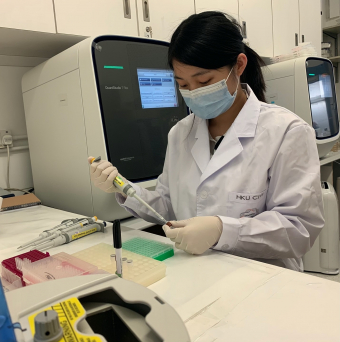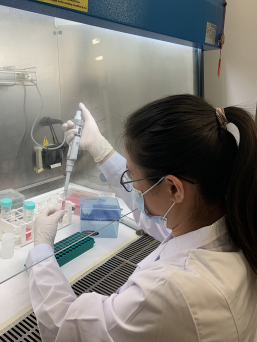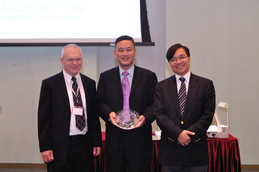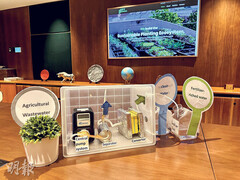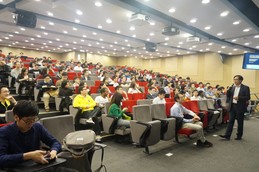HKU Engineering cross-disciplinary team develops new sewage surveillance method targeting COVID-19 virus variants
18 Jun 2021
Back to NewsHKU Engineering cross-disciplinary team develops new sewage surveillance method targeting COVID-19 virus variants
17 Jun 2021
(1). Extraction of SARS-CoV-2 virus RNA from sewage
(2). Detection of variants of SARS-CoV-2 virus
Testing of COVID-19 virus in the sewage is one of the key techniques to detect and fight the virus. The sewage monitoring system developed by a cross-disciplinary research team led by Professor Tong Zhang at the Department of Civil Engineering of the University of Hong Kong (HKU) has identified more than 50 confirmed COVID-19 cases in the city so far.
The method developed by the team earlier contains a two-step separation and seeks to detect the two gene segments of the SARS-CoV-2 virus for determining the presence of SARS-CoV-2 in sewage. As this approach targets only the conserved region of the viral genome, it cannot distinguish different types of SARS-CoV-2 variants.
In this regard, Professor Zhang’s team has recently developed a new testing method which can identify COVID-19 variants in sewage. The new testing method was earlier applied in testing a sewage sample collected on May 2, 2021 from Fung Hing House, Hing Wah (II) Estate (Chai Wan), and identified successfully positive signals of N501Y and other mutations of the Beta variant (known as B.1.351, first identified in South Africa). A positive case involving the COVID-19 mutant was later confirmed on May 7, 2021.
Professor Zhang said: “There is an urgent need for developing a new testing methodology for monitoring the transfer of SARS-CoV-2 variants in Hong Kong. With the team’s experiences in method development, this new testing method invented by us targets different mutations of the spike protein of SARS-CoV-2 and can rapidly (within a few hours) detect and quantify SARS-CoV-2 variants with high specificity in the sewage sample.”
The research on sewage testing of SARS-CoV-2 virus received funding by the Hong Kong SAR Government and has started since July 2020 in HKU. The sewage surveillance was lauded by the Chief Executive, Mrs Carrie LAM, who said earlier that “The anti-epidemic work of the Government has all along been based on science. The sewage surveillance project is an extremely good example of our joint efforts with local scientific teams to fight the virus with technology. The HKU team has continued to improve and optimise the testing method of SARS-CoV-2 and its variants. I thank the cross-disciplinary team of HKU and colleagues of government departments, including the Drainage Services Department and the Environmental Protection Department, for their hard work, who continue to leverage innovative technology to fight the virus through sewage surveillance.”
The team comprises six experts in the field of environmental microbiome and public health. Professor Tong ZHANG is the Principal Investigator of HKU’s Environmental Microbiome Engineering and Biotechnology Laboratory. He is a pioneer in applying DNA and RNA technology to study environmental microbiome and has more than 20 years of experience in the field of environmental microbiology. Other team members include Dr. Yu DENG from Civil Engineering, and Professor Leo Lit Man POON, Professor Malik PEIRIS, Professor Gabriel LEUNG, and Dr. Hein Min TUN of the School of Public Health, Faculty of Medicine of HKU. Professor POON and Professor PEIRIS lead the WHO Reference Laboratory for COVID-19 diagnostics at HKU and are well-known for their extensive expertise in developing testing methods for emerging virus of public health concerns, including SARS-CoV-2. Professor Gabriel LEUNG is the Dean of Li Ka Shing Faculty of Medicine at the University of Hong Kong, and an expert in infectious disease epidemiology.
About HKU Faculty of Engineering
The Faculty of Engineering is one of the founding Faculties of the University of Hong Kong established in 1912. Since its foundation, the Faculty has kept pace with developments in the engineering world and is always at the forefront of engineering research, evolving into one of the largest Faculties at the University with five departments providing undergraduate, postgraduate and research degrees in a wide range of important fields of modern engineering, technology and computer science.
The Faculty aims at providing an all-round education for students, equipping graduates not only with knowledge of cutting-edge technology, but also excellent communication and social skills, an innovation mindset, a lifelong learning attitude, professional integrity and international exposure. For more information, please visit https://engg.hku.hk.
E-Newsletter
Get the latest technology and news from us
If you do not wish to receive emails from us in the future, you can send an unsubscribe request to us by email to info@tto.hku.hk.


